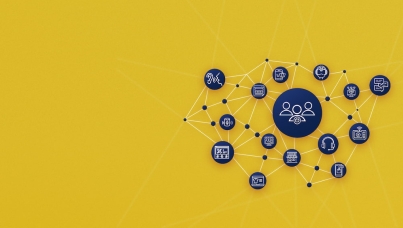Customer Experience is Everyone’s Business
According to the latest Ipsos Captains of Industry survey, just 21% of business leaders would rate their organisation as good at consistently delivering high-quality customer service. With poor ratings increasing sharply from 2016 (15% to 24%), are UK businesses taking the role of delivering an exceptional customer experience seriously?
The Vision
Have you ever assumed someone else will take care of something, then it never gets done? An idea is only an idea until someone takes responsibility. It’s nice to think that everyone knows that Customer Experience is important, but does everyone know their role in bringing this vision to life?
66% of business leaders rate their organisation highly as having a clear vision of the Customer Experience they want to deliver. They understand the importance of staying ahead of the rising demands of customer expectations in order to compete in this increasingly competitive society.
However, this year, the number of Captains rating their organisation ‘poor’ at delivering a Customer Experience that is consistent with their brand promise has increased substantially, rising from 13% to 22% over the last year.
We know that aligning a brand’s promise to its customer’s actual experience is integral to a successful and loyal relationship, so what is preventing the vision from becoming a reality?
The rising demands of customer expectations
Historically, customers have only expected the basics from businesses, such as good-quality products and competitive pricing. However, as technology accelerates and permeates all industries, customer expectations have rapidly increased – and continue to do so. The effect of not living up to a customer’s expectations now goes well beyond a lost sale. The advent of social media has meant customers are now able to inflict widespread reputational damage with a few taps or clicks.
The game has been changed, too. Customers now expect a flawless experience from every interaction with any company. This means the same kind of immediacy, personalisation and convenience that only the elite Customer Experience front-runners such as Google and Amazon have achieved. Other organisations – even industry-leading giants – are struggling to keep pace with these rising demands.
More than a third (37%) of Captains see changing customer expectations as the biggest challenge they face over the next few years to improve Customer Experience in their organisation. As one business leader put it: “Businesses think they are working harder and getting better, but customers’ expectations are rising faster than businesses can improve.”
Following the same trend as last year, further challenges they anticipate include:
- Technology/IT (18%)
- Quality of staff/availability of skilled workforce (13%)
- Getting to grips with changing customer needs
It is an exciting time for Customer Experience as technology continues to develop tools to create a more immediate and personalised service. With the right strategy in place, businesses will be able to connect with their customers on a deeper level than ever before.
Yet 22% of Captains currently rate their company as poor at understanding their customers’ needs, doubling from 11% in 2017. Obviously, every customer has different opinions as to what makes a great Customer Experience, so it’s becoming increasingly important to understand individual expectations as well as focusing on how to fulfil their needs.
Being able to act on feedback from customers is a great way to get to grips with their growing expectations and resolve any negativity before it becomes a larger problem. However, currently just 35% of Captains rate their businesses positively in this area.
To gain a competitive advantage over the competition, business leaders need to work alongside new technology, continuously listening to the voice of their customer in order to develop a more personalised business model that can evolve alongside their customers’ rising demands.
But whose responsibility is this?
A common barrier for businesses in providing a better Customer Experience is knowing whose responsibility it is. Captains overwhelmingly agree that the Chief Executive holds ultimate responsibility when it comes to Customer Experience (72%), a result particularly apparent in larger firms. However, from the CEO level down, accountability for Customer Experience is less well defined.
According to the poll, Captains feel that those who hold any responsibility across their business include:
- CEO (82%)
- Marketing Director (58%)
- Sales Director (49%)
- Customer Experience team (48%)
- Managing Director (45%)
- Chief Customer Officer (28%)
- Employees (11%)
Apart from the Marketing Director, responsibility across the business has been decreasing year-on-year. Notable mentions include the dedicated Customer Experience team, dropping from 64% to 48%, and the Managing Director, who has dropped from 65% to 45%.
These results suggest that there is no clear structure in organisations for employees to begin taking ownership over Customer Experience. Although it is clear that the CEO holds the ultimate responsibility, in order to deliver an experience that matches the needs and expectations of the customer, business leaders must overcome the structural constraints within their organisation.
Customer Experience is not a tool that can be turned off and on, it requires organisations to make important cultural changes. While business leaders can make it a priority, for a new initiative to succeed it needs broad support across the entire business. Every division needs to understand the company’s Customer Experience strategy and see their own role as an important part of the bigger picture. Everybody, from board to shop floor, has the responsibility to enhance Customer Experience in some form.
Moving Forward
So, how do you achieve a culture of engaged employees? You have to earn it. Business leaders should set and communicate a clear customer-centric vision.They must get involved and stay involved.
One Captain commented that, in order to achieve improved Customer Experience, their business must introduce “…significant training and leadership development in the development of our people in customer management and an implementation in a company-wide CRM system.” People need to understand their role in improving Customer Experience and learn how it fits into the organisations larger picture. By inviting employees to engage with these types of initiatives, they will be more likely to feel empowered to make a difference.
In short, everyone needs to know that it’s everyone’s business.




